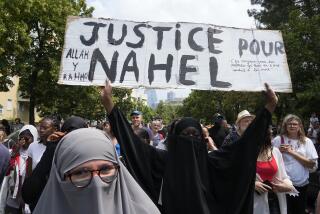Soccer Devotees Cry ‘Sacre Bleu!’ Over Cruel Loss
- Share via
PARIS — Nobody rioted here Tuesday after France lost to Denmark in the World Cup.
Unlike Russian fans who went berserk in Moscow last weekend, nobody got brutally drunk, attacked foreigners or committed soccer-induced homicide in France, despite a humiliating debacle that caused the first elimination of a defending champion in the tournament’s opening round since 1966.
It’s just a game, the elaborate Parisian shrugs and tighter-than-usual lips seemed to say. It’s the end of the World Cup for us, not the end of the world.
But beneath the show of sang-froid, the French were crushed.
You could tell from the tears streaking blue-painted faces congregated at a giant screen showing the game outside City Hall.
You could tell from the funereal gait of pedestrians on a sunny Champs-Elysees plastered with suddenly forlorn ads, posters and magazine covers glorifying the suddenly fallen champions, the once-beloved national team known as “Les Bleus.”
You could tell from the epic sigh of the young counterman in a cafe in the Rue de Passy shopping district across the river from the Eiffel Tower. When a postgame customer had the nerve to ask how he was doing, the clerk responded simply, morosely, accusingly: “So, which team are you rooting for?”
Les Bleus gave France the blues Tuesday. Forget Waterloo. The new capital of the geography of grief was Inchon, South Korea. It was the site of the game and the scene of the crime, where the Danes won 2-0.
Defeat tasted especially bitter because the French roster featured some of the world’s best-paid and most gifted players. This country fell in love with the team, and the sport of soccer, after hosting the World Cup in 1998 and winning it.
Four years ago, millions of revelers celebrated their championship in the streets. Politicians, pundits and other manufacturers of instant symbols decided that the dashing multiethnic team was an ideal banner of national pride and cross-cultural brotherhood.
And this year, soccer-mania had generated more interest and excitement than politics. One factor accounting for the record-low turnout in Sunday’s legislative elections was that many voters were too busy watching the games to go to the polls.
So it was hard to believe that the titans who brought down mighty Brazil four years ago packed their bags and trudged toward the exit without having won a game in World Cup 2002. The defenseless defending champions did not manage to score a single goal in the tourney--an embarrassing historical first.
“Les Bleus, the champions of the world and the champions of Europe, have left by the back door, and that’s the least that can be said even if we want to be gentle ... with this once-untouchable team,” wrote sports commentator Jean-Marc Mena. “Today, tomorrow, each of us will use and abuse the guillotine. Perhaps it will be the fault of [Coach] Roger Lemerre, the referees, the calendar, bad luck, the goal posts.”
This being France, sidewalk philosophers were on hand to provide theories and analyses. A common conclusion: The group that has won several European championships along with the World Cup since 1996 has aged badly.
“New blood!” chanted despondent viewers at a sports cafe in the city of Lyon.
Massive paychecks and inflated egos were also to blame, others suggested.
“Now I’m going to root for Tunisia and especially Senegal because they aren’t rolling in money,” said a 62-year-old Parisian cabdriver who gave his name as Hacine. “Maybe that’s one of the explanations for France: Too much money is not good.”
An undeniable weakness was the fateful injury to superstar Zinedine Zidane, the midfielder who is considered the top player in the sport today. The smooth, quietly spectacular Zidane, the Marseille-born son of an Algerian immigrant, missed the first two games. His absence hurt. But his return from the injured list Tuesday had die-hards predicting that salvation was at hand, even though France would have had to win by two goals to advance to the next round.
It was painful to watch an out-of-form Zidane hobble bravely through the battle against Denmark with a heavily bandaged thigh. The heralded savior failed his followers, but they said it wasn’t all his fault.
“Zidane isn’t the French team all by himself. The team has 11 players,” said Adriano Ribero, a Frenchman of Portuguese descent who was in the crowd of 5,000 watching the game in front of City Hall. “They played badly--very, very badly. This wasn’t worthy of a national team.”
The French are into soccer, but the top league’s fervor, pay scale and quality do not quite match those of powerhouses such as Italy, Spain and England.
The 1998 World Cup did give soccer a bigger audience, including women and girls, such as three 15-year-olds at City Hall who had painted the French flag and player David Trezeguet’s name on their faces. But the catastrophe left one fan with a serious case of the doubts.
“I think I’ve kind of lost interest,” said Guillaume Fousse, 31, a video technician. “Today it’s over. I’ll have to find another team to support. But I’m not sure if my interest in soccer will continue.”
Political leaders who once basked in the champions’ glory preached restraint and loyalty.
Although President Jacques Chirac admitted to being “profoundly disappointed,” he urged the team to overcome the loss and preserve France as a “global leader” in soccer. Prime Minister Jean-Pierre Raffarin sent a message of sympathy to Les Bleus. He warned fickle fans not to “burn today what we adored yesterday.”
Talk of burning and guillotines can’t have helped the mood of the vanquished squad. The players will return to an already introspective nation with a talent for melancholy and a strong new reason for some world-class brooding.
“Les Bleus have been eliminated, we have been eliminated,” wrote Mena, the commentator. “Condemned to rebuild, condemned to hang our heads.”
Sarah White in The Times’ Paris Bureau contributed to this report.






